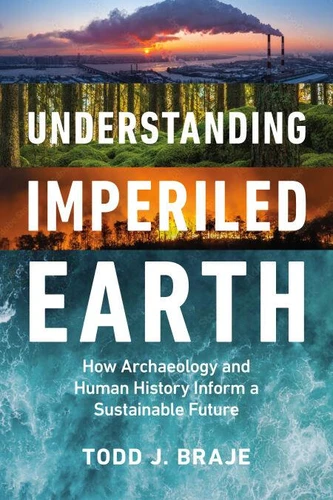Understanding Imperiled Earth. How Archaeology and Human History Can Inform a Sustainable Future
Par :Formats :
Disponible dans votre compte client Decitre ou Furet du Nord dès validation de votre commande. Le format ePub protégé est :
- Compatible avec une lecture sur My Vivlio (smartphone, tablette, ordinateur)
- Compatible avec une lecture sur liseuses Vivlio
- Pour les liseuses autres que Vivlio, vous devez utiliser le logiciel Adobe Digital Edition. Non compatible avec la lecture sur les liseuses Kindle, Remarkable et Sony
- Non compatible avec un achat hors France métropolitaine
 , qui est-ce ?
, qui est-ce ?Notre partenaire de plateforme de lecture numérique où vous retrouverez l'ensemble de vos ebooks gratuitement
Pour en savoir plus sur nos ebooks, consultez notre aide en ligne ici
- Nombre de pages192
- FormatePub
- ISBN978-1-58834-760-2
- EAN9781588347602
- Date de parution05/03/2024
- Protection num.Adobe DRM
- Taille10 Mo
- Infos supplémentairesepub
- ÉditeurSmithsonian Books
Résumé
A unique introduction to how understanding archaeology can support modern-day sustainability efforts, from restoring forested land to developing fire management strategiesAn essential and hopeful book for climate-conscious readersThe world faces an uncertain future with the rise of climate change, biodiversity loss, deforestation, overfishing, and other threats. Understanding Imperiled Earth meets this uncertainty head-on, presenting archaeology and history as critical guides to addressing the modern environmental crisis.
Anthropologist Todd J. Braje draws connections between deep history and today's hot-button environmental news stories to reveal how the study of the ancient past can help build a more sustainable future. The book covers a diverse array of interconnected issues, including: how modern humans have altered the natural world conservation work of Indigenous communities extinction of megafauna like dire wolves and woolly rhinoceros the risk of deforestation highlighted by Notre Dame's destruction the extinction crisis reflected by endangered bird species in Hawai'i fish scarcity driving demand and price, like the single blue-fin tuna fish that sold for three million dollars importance of "action archaeology" Braje examines how historical roots offer a necessary baseline for a healthier Earth, because understanding how the planet used to be is fundamental to creating effective restoration efforts moving forward through urban forests, sustainable food webs, and more.
Understanding Imperiled Earth offers an illuminating, hopeful, and actionable approach to some of the world's most urgent problems.
Anthropologist Todd J. Braje draws connections between deep history and today's hot-button environmental news stories to reveal how the study of the ancient past can help build a more sustainable future. The book covers a diverse array of interconnected issues, including: how modern humans have altered the natural world conservation work of Indigenous communities extinction of megafauna like dire wolves and woolly rhinoceros the risk of deforestation highlighted by Notre Dame's destruction the extinction crisis reflected by endangered bird species in Hawai'i fish scarcity driving demand and price, like the single blue-fin tuna fish that sold for three million dollars importance of "action archaeology" Braje examines how historical roots offer a necessary baseline for a healthier Earth, because understanding how the planet used to be is fundamental to creating effective restoration efforts moving forward through urban forests, sustainable food webs, and more.
Understanding Imperiled Earth offers an illuminating, hopeful, and actionable approach to some of the world's most urgent problems.
A unique introduction to how understanding archaeology can support modern-day sustainability efforts, from restoring forested land to developing fire management strategiesAn essential and hopeful book for climate-conscious readersThe world faces an uncertain future with the rise of climate change, biodiversity loss, deforestation, overfishing, and other threats. Understanding Imperiled Earth meets this uncertainty head-on, presenting archaeology and history as critical guides to addressing the modern environmental crisis.
Anthropologist Todd J. Braje draws connections between deep history and today's hot-button environmental news stories to reveal how the study of the ancient past can help build a more sustainable future. The book covers a diverse array of interconnected issues, including: how modern humans have altered the natural world conservation work of Indigenous communities extinction of megafauna like dire wolves and woolly rhinoceros the risk of deforestation highlighted by Notre Dame's destruction the extinction crisis reflected by endangered bird species in Hawai'i fish scarcity driving demand and price, like the single blue-fin tuna fish that sold for three million dollars importance of "action archaeology" Braje examines how historical roots offer a necessary baseline for a healthier Earth, because understanding how the planet used to be is fundamental to creating effective restoration efforts moving forward through urban forests, sustainable food webs, and more.
Understanding Imperiled Earth offers an illuminating, hopeful, and actionable approach to some of the world's most urgent problems.
Anthropologist Todd J. Braje draws connections between deep history and today's hot-button environmental news stories to reveal how the study of the ancient past can help build a more sustainable future. The book covers a diverse array of interconnected issues, including: how modern humans have altered the natural world conservation work of Indigenous communities extinction of megafauna like dire wolves and woolly rhinoceros the risk of deforestation highlighted by Notre Dame's destruction the extinction crisis reflected by endangered bird species in Hawai'i fish scarcity driving demand and price, like the single blue-fin tuna fish that sold for three million dollars importance of "action archaeology" Braje examines how historical roots offer a necessary baseline for a healthier Earth, because understanding how the planet used to be is fundamental to creating effective restoration efforts moving forward through urban forests, sustainable food webs, and more.
Understanding Imperiled Earth offers an illuminating, hopeful, and actionable approach to some of the world's most urgent problems.



